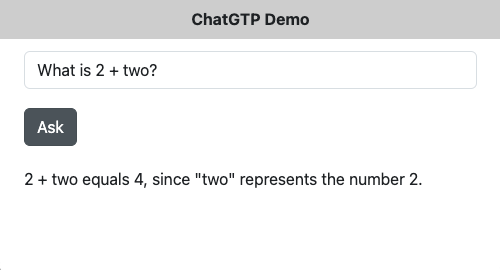Add AI to your app using ChatGPT: Difference between revisions
No edit summary |
|||
| Line 60: | Line 60: | ||
===== Notes ===== | ===== Notes ===== | ||
===== See Also ===== | |||
Revision as of 14:14, 17 September 2024
Introduction
You can add AI capabilities to any AppStudio app. This can be in the form of a question box, or based on information that your app has collected about the user's needs. Almost any valid query will work, whether generated by the user or constructed by your app.
The method described here is based on ChatGPT, currently the most widely used AI assistant. Other AI assistants can be used. While their implementation details may differ, the general method will be similar.
The first step is to set up an account at ChatGPT. You will need to enter a credit card as well - but usage for testing purposes is quite inexpensive.
Once that is done, you will need to get an API Key. It's a long string you will need to paste into your app - see the sample code.
Note that the API Key needs to be kept secret. For testing, it's fine to leave it hard coded in your app. However, if you deploy it to your website, anyone with a browser will be able to see it.
Sample
Here is some sample code, followed by notes on its usage:
const apiKey = "my-api-key"; // Replace with your actual API key
async function callChatGPT(prompt) {
const url = "https://api.openai.com/v1/chat/completions";
// Prepare the request body
const data = {
model: "gpt-4o-mini", // or 'gpt-4' if you have access
messages: [{ role: "user", content: prompt }],
// Optionally you can specify other parameters like temperature
// See the API docs here:
// https://platform.openai.com/docs/api-reference/chat/create
};
try {
const response = await fetch(url, {
method: "POST",
headers: {
Authorization: `Bearer ${apiKey}`,
"Content-Type": "application/json",
},
body: JSON.stringify(data),
});
// Check if the response is ok (status code 200-299)
if (!response.ok) {
throw new Error(`HTTP error! status: ${response.status}`);
}
const result = await response.json();
console.log("ChatGPT response:", result.choices[0].message.content);
return result.choices[0].message.content;
} catch (error) {
NSB.MegBox("Error calling ChatGPT:", error);
}
}
Button1.onclick = async function(){
lblResults.innerHTML = "Processing..."
result = await callChatGPT(inpQuestion.value);
lblResults.innerText = result;
}
